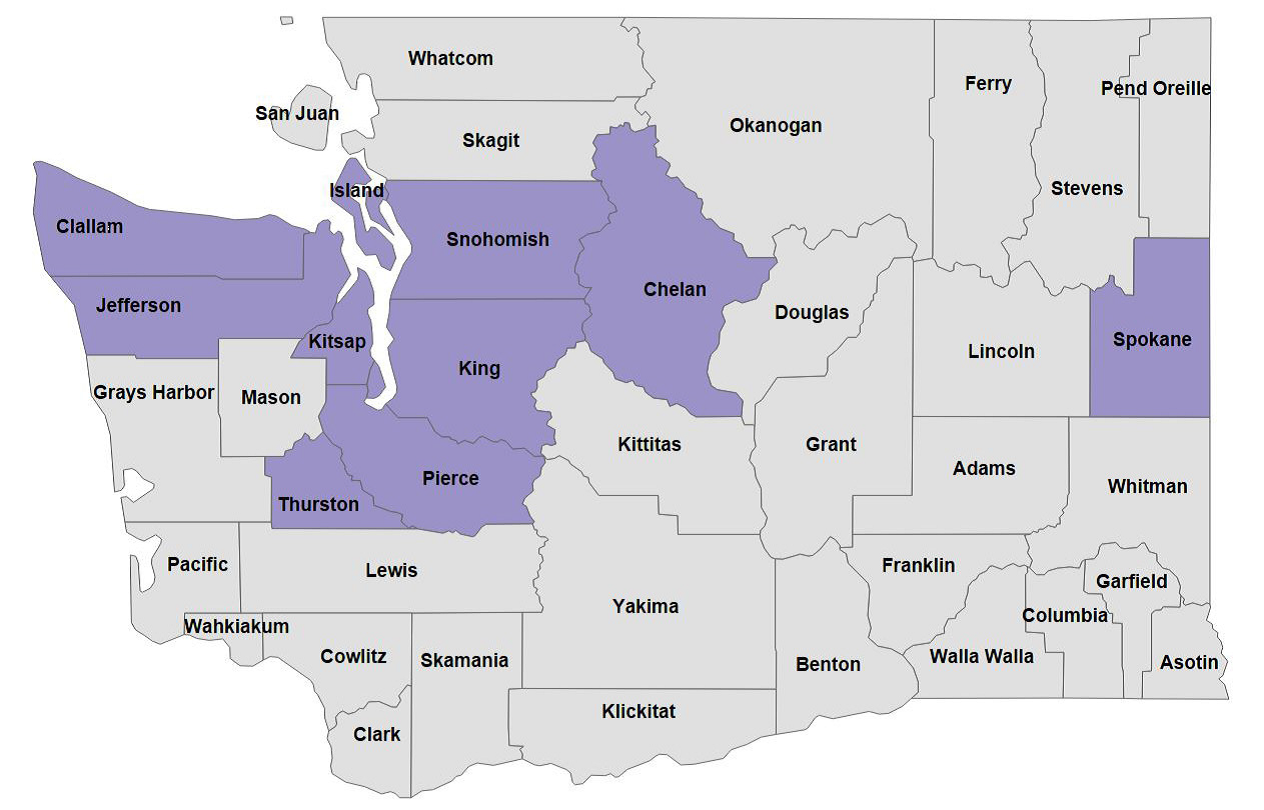Family and Juvenile Court Improvement Program (FJCIP)
The Family and Juvenile Court Improvement Program (FJCIP) courts outperform other courts in Washington State in compliance with dependency timelines. The FJCIP incorporates Unified Family Court (UFC) principles in a model that allows flexible implementation centered on core elements, including stable leadership, education, and case management support. In addition to the core elements, the FJCIP coordinators gather and analyze data which is then shared with local dependency stakeholder groups working on system improvement.
The FJCIP promotes a system of local improvements that are incremental and measurable. Funding for the FJCIP makes system improvements possible in each court regardless of size, calendaring systems, number of judges, or availability of resources. The goal of this effort is to foster judicial and court administration leadership to institute improvements in family and juvenile court that are consistent with UFC principles.
FJCIP courts provide meaningful assistance and services to families and other stakeholders involved in dependency and family court. These services impact several kinds of outcomes, ranging from a parent’s understanding of court processes to decision-makers receiving more relevant information. Contributions that FJCIP courts make to both legal and real-life outcomes are similarly influenced by the court environment and by the range of services and benefit programs available in the jurisdiction.
FJCIP courts work more collaboratively in dependency cases, not only with their court partners but also with community partners, to connect youth and families with community resources. Because these FJCIP courts provide dedicated staff to manage court processes for dependency cases and under judicial leadership provide assistance to convene stakeholder groups to work collaboratively on systemic improvements, overall, dependency outcomes are improving in these courts, compared to courts that do not have FJCIP support.
The data provided in the Dependent Children in Washington State: Case Timeliness and Outcomes, 2017 Annual Report demonstrates that FJCIP courts generally perform better than other courts on timeliness measures. This is due, at least in part, to the court’s focus on improving dependency processes with dedicated staff to monitor and bring attention to areas that need to be addressed.
The FJCIP coordinators support and collaborate with each other through a Community of Practice, which allows the coordinators to meet online monthly and during twice yearly visits. These online and in-person sessions allow coordinators to share innovative ideas, ask questions, and work together toward continuous quality improvement.
The Administrative Office of the Courts oversees the FJCIP program and provides an annual report to the legislature.
History
In 2008, Second Substitute House Bill (2SHB) 2822 established the FJCIP. It provided funds for the initial efforts to reform and enhance court systems that manage family and juvenile cases. The Legislature wanted to improve the dependency system in Washington State to be consistent with Unified Family Court (UFC) principles being adopted nationwide. The judicial branch agreed and asked that improvements be focused on local circumstances. The guiding principles for reform are based on the UFC methodology as well as state and federal timelines related to processing dependency cases. The FJCIP is a balanced approach that directs the dependency reform efforts but allows courts autonomy in deciding how to focus their efforts within the context of UFC. The FJCIP also requires judicial officers to receive a minimum of 30 hours of topic-specific training to preside over family and juvenile cases.
Initially, state funding of $800,000 provided grants to 16 sites across the state to begin reformation efforts and enhance court systems that manage family and juvenile cases. The money primarily funded case coordinators who worked with the juvenile court/ UFC chief judges to conduct local court analysis of service delivery. Findings from the Timeliness of Dependency Case Processing in Washington, 2008 Annual Report were used to establish local improvement plans to facilitate enhancements to court practices using the UFC principles as a guide.
State funding was reduced after the first year and currently $598,819 is allotted for the FJCIP annually. The funding reduction precluded funding of innovative projects, training, and travel. Funding covers 86% of the salaries and benefits for the FJCIP coordinator positions. Despite these cuts, ten superior courts continue to participate in the FJCIP: Chelan, Clallam, Island, Jefferson, King, Kitsap, Pierce, Snohomish, Spokane, and Thurston. A small annual investment of approximately $600,000 realizes financial benefits over time, not to mention improved outcomes for children and families, and ultimately savings for the state.
The FJCIP continues to deliver on the promise that local reform efforts can be accomplished based on a set of universal best practice principles. During these years of maintenance, our mission has been to develop projects within existing resources that yield statewide benefit, implement a system of evaluating statewide and local projects, and design a communication plan between the sites and the Legislature. By these actions, the FJCIP has proven to be a solid investment of state funds. The primary focus for the administration of the FJCIP is working with other stakeholders in family and juvenile court operations for dependency cases and family law cases, and to coordinate dependency reform efforts.
FJCIP Courts in Washington State

Reporting
RCW 2.56.230 requires the Administrative Office of the Courts (AOC) to compile a financial report, comparing the spending plan to actual expenditures, for submission to the Legislature. When state funding for the FJCIP was reduced in 2009, salaries and benefits of FJCIP coordinators became the primary funding objective for the program, and other expenses, such as training, office supplies, etc., were not able to be reimbursed.
|







